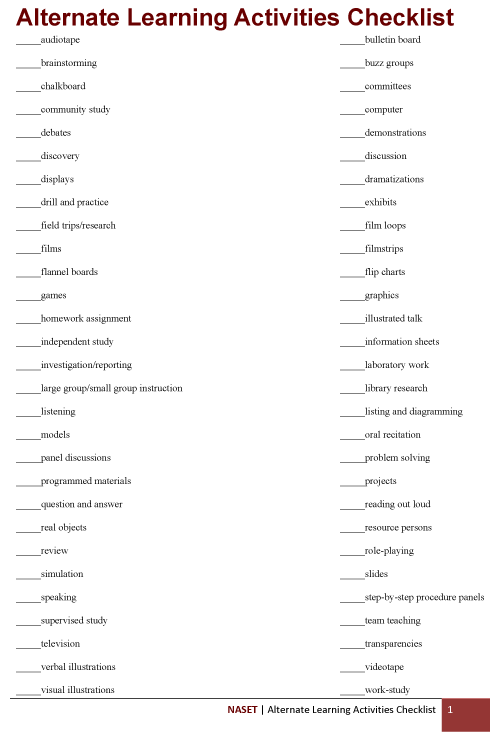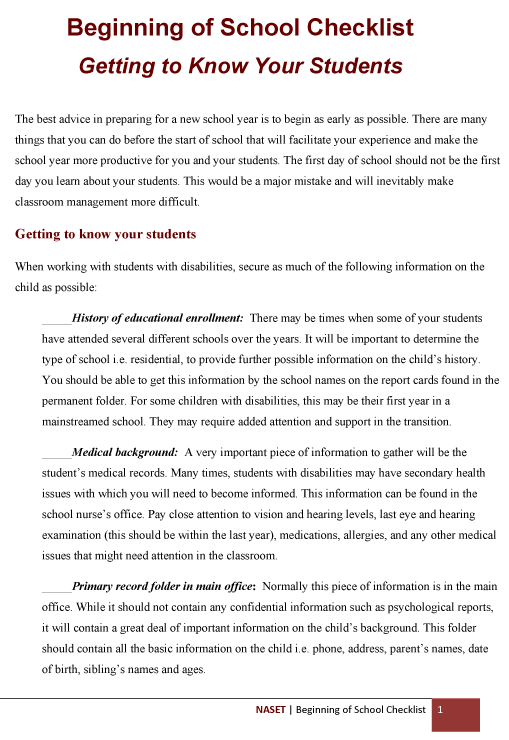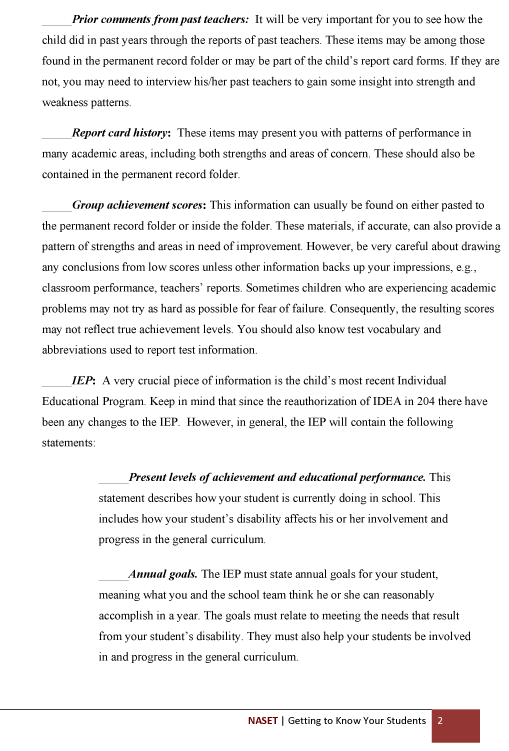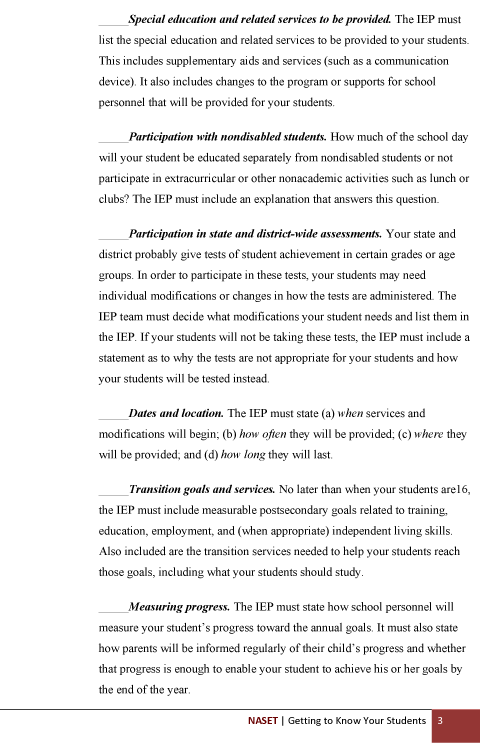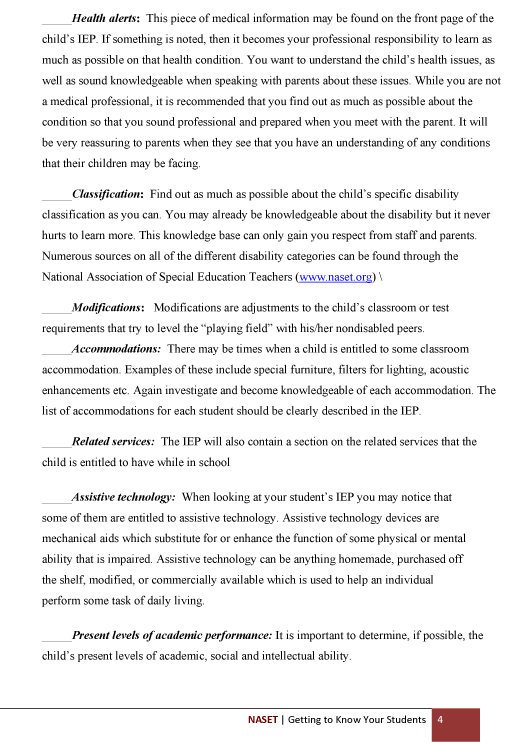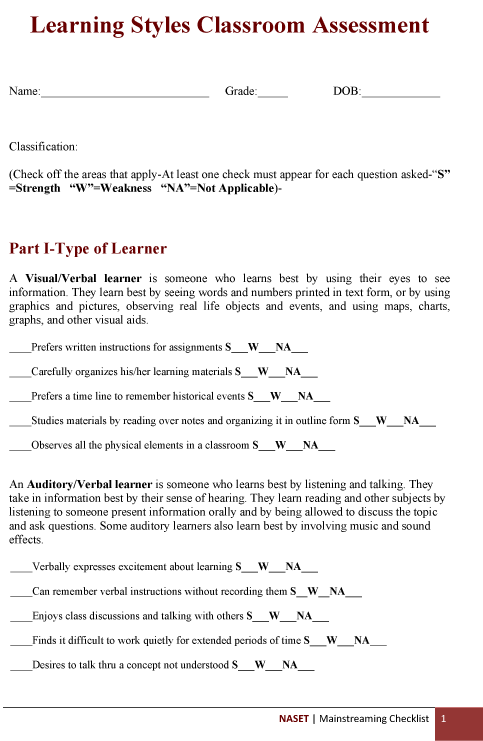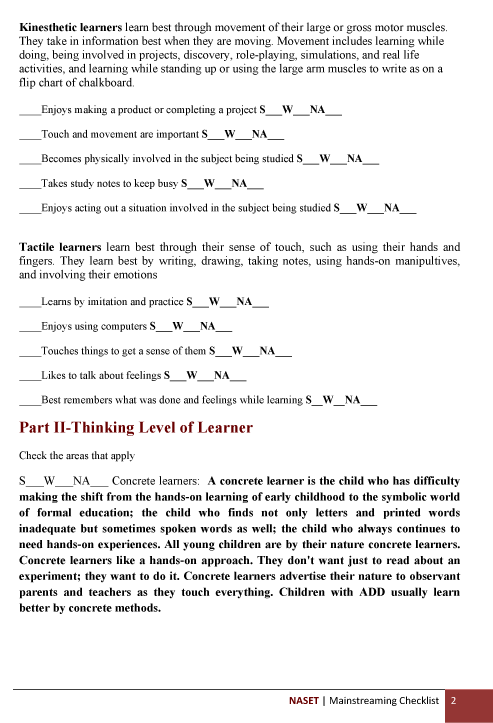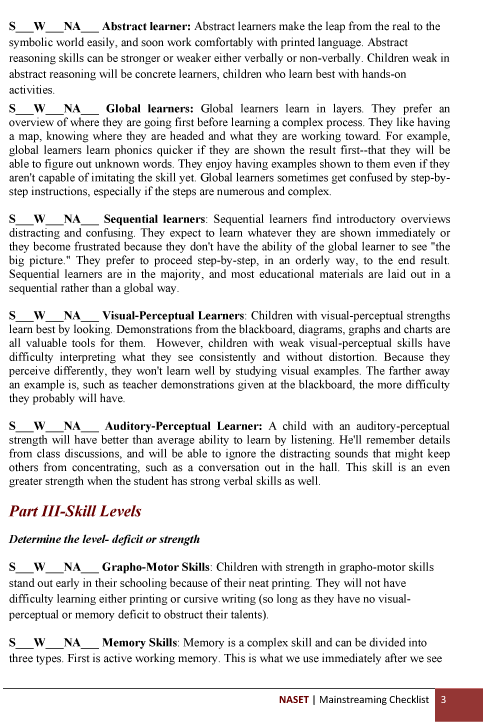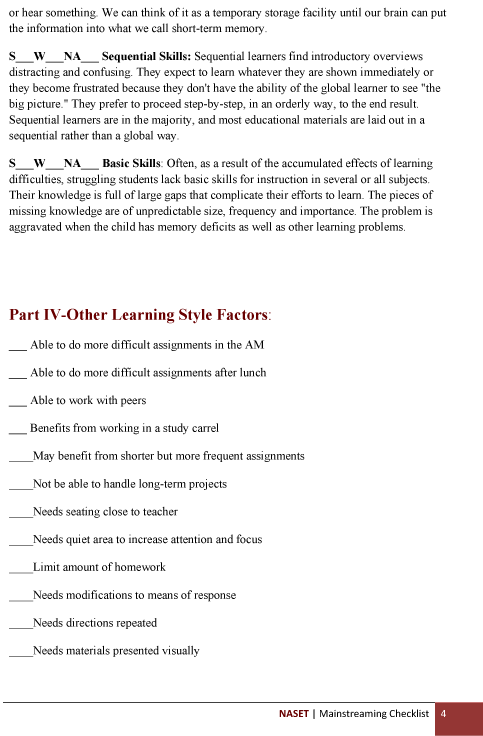Classroom Management
Checklists
• Alternate Learning Activities Checklist
• Beginning of School Checklist-Getting to Know Your Students
• Learning Styles Classroom Assessment
• Multiple Intelligences Inventory
• Possible Occupational Therapy Services Checklist
• Teacher Checklist of Classroom Characteristics
Procedures
• Best Practices and Accommodation Procedures for Working with Students with Emotional Disturbance
• Developing Behavior Contracts
Checklists
Mainstreaming Checklist
1. ____ The child has become familiar with the rules and routines of the regular class in which he/she will be mainstreamed
2. ____ The student’s Individual Educational Plan objectives and modifications have been discussed with mainstreamed teacher
3. ____ The child has indicated a positive desire to participate in a regular class environment
4. ____ The child has been coached on how to deal with possible reactions and situations presented by other students m, both positive and negative
5. ____ The child is capable of remaining focused for appropriate periods of time while in the regular classroom
6. ____ The mainstreamed classroom teacher has been educated on the special needs of the disabled child
7. ____ The mainstreamed teacher has been given the proper assistance on the use and purpose of any devices or apparatus used by the disabled student
8. ____ The mainstreamed teacher has been appraised of the student’s skill levels
9. ____ The mainstream teacher has been appraised of the child’s learning style
10. ____ The mainstreamed teacher has been appraised of the child’s strength areas and limitations
11. ____ The mainstreamed teacher has been informed of the supportive services provided to the student
12. ____ The mainstreamed teacher has prepared his/her class for the incoming student
13. ____ The mainstreamed teacher has been assigned a specific special service staff member to contact in case of some difficulty
14. ____ The mainstreamed teacher has been given the proper management skills that might be required in dealing with the child while in the mainstreamed class
15. ____ The students in the mainstreamed class have been educated on handicapping conditions and the reasons for mainstreaming
16. ____ The child’s parents have met the mainstreamed teacher
17. ____ The child’s parents have been involved in the planning of their child’s mainstreaming experience
18. ____ The child’s parents have been given assistance on parenting techniques that will encourage the child’s progress and increase the chances of success of the mainstreaming experience
19. ____ A member of the mainstreaming team has presented the concept of mainstreaming, its purpose and what is gained at a PTA meeting for parents of non disabled children
20.____ The administrator has been informed of the mainstreaming procedure for this particular child.
Download a PDF Version of this Checklist – CLICK HERE
Multiple Intelligence Inventory
Put an “x” ( x ) next to those statements which basically are true about the student.
Linguistic Intelligence (Language, speaking, writing, etc.)
1. ___ I love books.
2. ___ I can mentally hear words even before I speak or write them.
3. ___ I often enjoy radio, CD’s, and recording more than TV, movies, or plays.
4. ___ I like word games like Scrabble, Yahtzee, Anagrams, Crosswords, etc.
5. ___ I like to recite tongue twisters, silly rhymes, and puns.
6. ___ People often ask me to speak in common vernacular so the can understand me.
7. ___ English, and classes based on reading (like history) are generally easier for me than math or science.
8. ___ I read the billboards on the highway more than I look at the scenery.
9. ___ I often talk about things I’ve read or heard (more than what I’ve seen, or done).
10. ___ am proud of what I write. Sometimes I get special recognition for my writing.
SCORE: ____
Logical-Mathematical Intelligence (LM), Math and Science
1. ___ I can easily compute numbers in my head.
2. ___ Math and/or science are among my favorite school subjects.
3. ___ I enjoy games and brainteasers that involve math.
4. ___ I enjoy creating little “what if” experiments. (e.g. How much can I save if I skip buying desert at lunch for a week? What will happen to my average if I score below a 90% on this test?)
5. ___ My mind searches for and finds patterns, rules, or logical sequences in things.
6. ___ I’m interested in new developments in science.
7. ___ I believe that almost everything has a rational explanation.
8. ___ I sometimes think in abstract concepts (rather than words or images).
9. ___ I like finding logical flaws in things people say or do (this doesn’t mean being negative).
10. __ I feel I know something better when it has been
measured, categorized, analyzed or quantified in some way.
SCORE___
Spatial Intelligence (Art, Design, etc.)
1. ___ I often see clear visual images when I close my eyes.
2. ___ I am sensitive to color.
3. ___ I like to take pictures with a camera or camcorder.
4. ___ I like jigsaw puzzles, mazes, or other visual puzzles.
5. ___ I have vivid dreams at night.
6. ___ I can generally find my way around when I am in new places.
7. ___ I draw and doodle.
8. ___ I like geometry better than algebra.
9. ___ I can easily visualize a birds-eye view of a location.
10. ___ I prefer books and reading materials that have lots of illustrations.
SCORE ___
Bodily-Kinesthetic Intelligence (dance, gymnastics, sports, etc.)
1. ___ I participate in at least one sport or physical activity on a regular basis.
2. ___ I find it difficult to stay still for long periods of time.
3. ___ I like to use my hands creatively at activities such as sewing, or carving, carpentry or model building.
4. ___ My best ideas often come to me when I am out for a long walk, jogging, working out, or engaged in some other physical activities.
5. ___ I often like to spend my free time outdoors.
6. ___ I use hand gestures and body language when I talk to people.
7. ___ I like to hold or touch things to learn more about them.
8. ___ I like the daredevil rides (like roller coaster) at amusement parks, and other thrilling experiences (like surfing, or mountain biking).
9. ___ I am well coordinated.
10. __ To learn a new skill I need to do it, rather than just hear about it or see it done.
SCORE ___
Musical Intelligence
1. ___ I have a good singing voice.
2. ___ I can tell when a note is off-key or out of pitch.
3. ___ I listen to music a lot.
4. ___ My life would be much less happy without music.
5. ___ I often have a tune running though my mind.
6. ___ I can easily keep time with a song, tapping, playing a percussion instrument, etc.
7. ___ I know lots of melodies to songs or musical compositions.
8. ___ If I hear a song once or twice, I can usually play or sing most of the melody.
9. ___ I often make tapping sounds or sing or hum when I am studying or working.
10. __ I play a musical instrument.
SCORE: _____
Interpersonal Intelligence (political, leadership, public relations, etc.)
1. ___ People come to me for advice, or to tell me their worries.
2. ___ I prefer group sports (like soccer or football) to solo sports (like jogging or swimming).
3. ___ I seek out friends of professional help (teachers, counselors, etc.) to help me solve my problems rather than trying to work it out by myself.
4. ___ I have at least three close friends.
5. ___ I prefer social games such as Monopoly or Magic over individual recreation like solitaire or video games (when played alone).
6. ___ I like to contribute ideas or projects in class, and I like to show others how to do things.
7. ___ I am a leader.
8. ___ I like being in a crowd.
9. ___ I like to get involved with clubs and other social gatherings.
10. __ I’d rather spend my evenings at a party or with friends than be at home by myself.
SCORE: _____
Intrapersonal Intelligence (Insightful, spiritual, sympathetic)
1. ___ I like to meditate, pray, or just think about things
2. ___ I have received counseling or gone to groups to learn more about myself.
3. ___ I am able to handle setbacks. I am resilient.
4. ___ I have a special hobby or interest that keeps me pretty much to myself.
5. ___ I have a clear idea of who I am and what my talents or weaknesses are.
6. ___ I have personal goals which I think about often.
7. ___ I am insightful and can sympathize or empathize with other people’s feelings.
8. ___ I am strong willed and independent.
9. ___ I keep a diary or journal of my inner life (thoughts and feelings.)
10. __ I prefer school assignments that allow me to chose what I want to do.
SCORE: _____
Naturalistic Intelligence (a new addition to Gardener’s Multiple Intelligence Inventory)
1. ___ I like to recycle things.
2. ___ I participate in or follow the news about a political activist group of some kind which supports ecology and/or natural living.
3. ___ I enjoy programs and/or magazines that have to do with nature.
4. ___ I enjoy hiking and camping.
5. ___ I like New Age products and ideas.
6. ___ I feed the birds or plan my flower garden to attract butterflies.
7. ___ I am concerned about the depletion of the rain forest, the ozone layer, and pollution.
8. ___ I am fascinated by native cultures that teach that man is part of nature.
9. ___ I like vegetarian food because it is healthier.
10. ___I support human rights, animal rights, and protecting trees.
SCORE: ___
Download a PDF Version of this Checklist – CLICK HERE
Possible Occupational Therapy Services Checklist
Sensory Problems
_____ cannot tolerate touch or continuously touch others
_____ sensitive to sound
_____ sensitive to visual changes
_____ sensitive to odors
Gross motor problems
_____ trouble with balance
_____ problems with coordination
_____ problems motor planning
Fine motor problems
_____ problems with coordination
_____ problems with handwriting
_____ problems uses scissors
Perceptual problems
_____ problems in eye-hand coordination
Daily living activities
_____ cannot dress him/herself
_____ cannot feed him/herself
_____ cannot take care of their own personal hygiene
Attention span
_____ trouble focusing on task
_____ short attention spans
Organizational problems
_____ difficulties with memory
Download a PDF Version of this Checklist – CLICK HERE
Teacher Checklist of Classroom Modifications
Environment
____ study carrels
____ change seating
____ reduce distractions where possible
____ change class assignment
____ change groups
____ create more physical space for teacher
____ use parent or cross/age tutors
____ special study area
____ other
Materials
____ use different materials (i.e. tapes, slates, language master, manipulatives, work jobs, task cards)
____ use diagnostic materials
____ learning games
____ computer
____ typewriter
____ other
Schedule
____ shorten day- reduce length of period (student can change task)
____ activity breaks
____ come later or go earlier
____ systematic inclusion (student works in time out area- goes to class only when willing to follow directions)
____ other
Assignment
____ simplify
____ shorten
____ individual contracts
____ buddy system
____ use of notebooks for assignment
____ bold type
____ tracing/copying for visual/motor reinforcement
____ alternative assignment structure
____ other
Teaching Techniques
____ “show me” cards or other whole class participation
____ vary voice volume as required
____ use eye contact
____ circulate around room
____ list assignments and/or instructions on board
____ use behavior modification
____ don’t grade during the learning phase- but do correct/analyze- give feedback to learner
____ other
Learning
____ have learner keep study book
____ agreement on learner’s part to accept designated responsibilities
____ if learner is told something, it is done
____ other
Use of Learning Style
____ for auditory sequencing problems- limit number of oral instructions, teach note-taking skills, use lessons on overhead/tape recorder
____ auditory
____ visual
____ kinesthetic
____ other
Miscellaneous
____ touch base with other school personnel
____ keep work samples
____ achievement testing
____ review files
____ parent contacts
____ other
Download a PDF Version of this Checklist – CLICK HERE
Writing Disorders Checklist
Children who are phonetically accurate spellers
_____ make phonetically accurate errors
_____ spell words exactly as they sound-”lite” for “light”
_____ spell words with only a general similarity to the actual word -”word” for “work”
_____ have difficulty associating verbal labels with pictorial information
_____ have problems with advanced language expression such as vocabulary definitions
Children who are phonetically inaccurate spellers
_____ demonstrate significant weaknesses in basic auditory skills
_____ have difficulty breaking words into syllables
_____ have difficulty retaining auditory information
_____ do not process language effectively
Children with mechanical writing disorders
_____ find writing a slow and labored process
_____ usually have poorly developed fine motor coordination
_____ typically lack finger dexterity
_____ may have had earlier problems with buttoning and tying
_____ may have difficulty with the spatial aspects of writing
_____ may form letters of varying sizes
_____ may leave gaps between letters of a word
_____ may run words together
_____ may exhibit directional confusion by reversing letters
Download a PDF Version of this Checklist – CLICK HERE
Procedures
Best Practices and Accommodation Procedures for Working with Students with Emotional Disturbance
• Develop consistent behavior expectations.
• Involve the student in setting academic and personal goals.
• Engage in role playing situations.
• Communicate with parents so that strategies are consistent at home and school.
• Set limits and boundaries.
• Apply established consequences immediately, fairly and consistently.
• Acknowledge and reinforce acceptable behavior.
• Avoid confrontation and power struggles.
• Provide a highly structured classroom environment.
• Clearly post rules and expectations.
• Establish a quiet cool off area.
• Provide and teach opportunities for the student to use self control/self monitoring techniques to control behavior.
• Teach self talk to relieve stress and anxiety.
• Teach and provide time for relaxation techniques.
• Establish cues as reminders for inappropriate behavior.
• Redirect to avoid situations that may increase anxiety levels.
• Remain calm and aware of your body language when addressing the student.
• Provide a positive and encouraging classroom environment.
• Use a study carrel.
• Use visually stimulating material for assignments/learning presentations.
• Use specialized technology and software.
• Develop and use behavior contracts.
• Give frequent feedback.
Download a PDF Version of this Procedure – CLICK HERE
Developing Behavior Contracts Procedures
A behavior contract is an agreement between the child and teacher and often includes the student’s parent(s).
The behavior contract is a written agreement about how the individual will behave.
It will indicate the appropriate consequence should the student neglect to behave according to the contract and it also states the reinforcer to be used for successful compliance. The behavior contract provides the student with structure and self-management.
Developing the Contract
The contract should be written with the student and teacher – collaboration. It would be wise to involve the parent under certain circumstances. The contract should include the following:
- The goal. (Will not speak out…..will keep hands to him/herself…..will remain on task….etc.)
- How will the student receive the reward? (Become the teacher’s monitor after completing 5 assignments on time etc.)
- What is the consequence should the child not adhere to the behavior described in the contract?
- Time should be clearly stated in the contract. You may choose a half day, a full day, a week etc.
- Define who and how the behavior will be monitored. (teacher initials, stickers, check mark system etc.)
- Set a date for reviewing the contract
It is important to involve the student in the writing of the contract.
Ask the student to make suggestions for reinforcement and consequence for failure to comply.
Contracts should name specific behaviors to be changed.
Focus on 1 or 2 behaviors at a time.
Consequences and reinforcers need to be thought out clearly. You can include tangible reinforcers, social or activity based reinforcers, curtailment of an activity, tokens that can be cashed in for a specific activity etc.
NOTE: A minor problem with behavior contracts is that the focus is on controlling a student’s behavior rather than helping the child make wise choices.
Keep this in mind when developing behavior contracts. Behavior contracts don’t often work right away, be patient and consistent, you should see results.
Know when it’s time to review and revise. When the contract is not working well, be sure to include the student when making revisions.
Some Successful Reinforcers/Rewards
- Teacher Helper
- Caring for Class Pet
- 5-10 Minute Free Choice Activity
- Happy Note to Mom
- Tell the Class a Joke or Read a Text Selection
- Free Library Period
- Read with a Buddy
- Listen to a taped story
- Provide Office Help
- Leading the Group
- Helping In Another Classroom
Once again, a little patience goes a long way.
It is critical for the student to know that you like them and that you’re only disappointed in their behavior.
Be sure to let the student know that you share their goals, you both want what’s best for the student. Praise goes a long way.
Download a PDF Version of this Procedure – CLICK HERE

